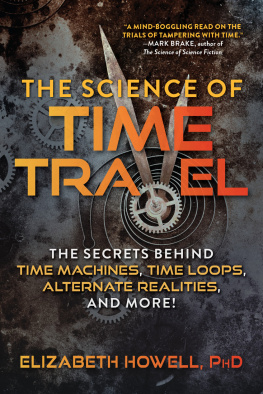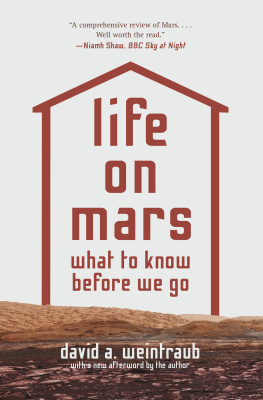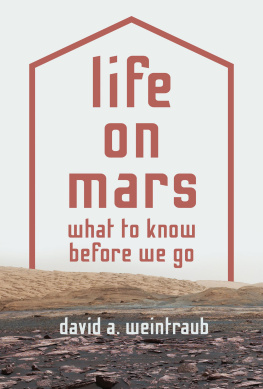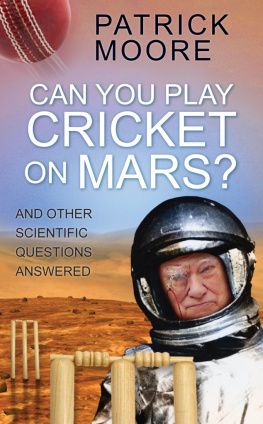Elizabeth Howell - The Search for Life on Mars: The Greatest Scientific Detective Story of All Time
Here you can read online Elizabeth Howell - The Search for Life on Mars: The Greatest Scientific Detective Story of All Time full text of the book (entire story) in english for free. Download pdf and epub, get meaning, cover and reviews about this ebook. year: 2020, publisher: Arcade, genre: Detective and thriller. Description of the work, (preface) as well as reviews are available. Best literature library LitArk.com created for fans of good reading and offers a wide selection of genres:
Romance novel
Science fiction
Adventure
Detective
Science
History
Home and family
Prose
Art
Politics
Computer
Non-fiction
Religion
Business
Children
Humor
Choose a favorite category and find really read worthwhile books. Enjoy immersion in the world of imagination, feel the emotions of the characters or learn something new for yourself, make an fascinating discovery.
- Book:The Search for Life on Mars: The Greatest Scientific Detective Story of All Time
- Author:
- Publisher:Arcade
- Genre:
- Year:2020
- Rating:5 / 5
- Favourites:Add to favourites
- Your mark:
- 100
- 1
- 2
- 3
- 4
- 5
The Search for Life on Mars: The Greatest Scientific Detective Story of All Time: summary, description and annotation
We offer to read an annotation, description, summary or preface (depends on what the author of the book "The Search for Life on Mars: The Greatest Scientific Detective Story of All Time" wrote himself). If you haven't found the necessary information about the book — write in the comments, we will try to find it.
Elizabeth Howell: author's other books
Who wrote The Search for Life on Mars: The Greatest Scientific Detective Story of All Time? Find out the surname, the name of the author of the book and a list of all author's works by series.
The Search for Life on Mars: The Greatest Scientific Detective Story of All Time — read online for free the complete book (whole text) full work
Below is the text of the book, divided by pages. System saving the place of the last page read, allows you to conveniently read the book "The Search for Life on Mars: The Greatest Scientific Detective Story of All Time" online for free, without having to search again every time where you left off. Put a bookmark, and you can go to the page where you finished reading at any time.
Font size:
Interval:
Bookmark:



Copyright 2020 by Elizabeth Howell and Nicholas Booth
All rights reserved. No part of this book may be reproduced in any manner without the express written consent of the publisher, except in the case of brief excerpts in critical reviews or articles. All inquiries should be addressed to Arcade Publishing, 307 West 36th Street, 11th Floor, New York, NY 10018.
First Edition
Arcade Publishing books may be purchased in bulk at special discounts for sales promotion, corporate gifts, fund-raising, or educational purposes. Special editions can also be created to specifications. For details, contact the Special Sales Department, Arcade Publishing, 307 West 36th Street, 11th Floor, New York, NY 10018 or .
Arcade Publishing is a registered trademark of Skyhorse Publishing, Inc., a Delaware corporation.
Visit our website at www.arcadepub.com.
Visit Elizabeth Howells site at elizabethhowell.ca.
10 9 8 7 6 5 4 3 2 1
Library of Congress Cataloging-in-Publication Data is available on file.
Library of Congress Control Number: 2020934878
Cover design by Erin Seaward-Hiatt
Cover photograph courtesy NASA/JPL/MSSS
ISBN: 978-1-950691-39-5
Ebook ISBN: 978-1-950691-66-1
Printed in the United States of America
If we are interested in Mars at all, it is only because we wonder over our past and worry about our possible future.
Ray Bradbury
CONTENTS
AUTHORS NOTE
This book has its origins in the 1990s, when Nicholas Booth was working in British newspapers writing stories on science and technology. The most exciting evening in his decade as a reporter occurred when the discovery of suspected fossilized life in the Allan Hills meteorite was announced in August 1996. It was every newspaper writers dream story. Originally intending to do a quick tie-in book, Nick began squirreling away notes. Prior to this, he had spoken with many of the first generation of researchers who were able to send instruments to Mars. Alas, a number of interviewees have since passed away. We hope that their words here reflect their significant contribution to the story. From 1996 onward, Nick continued more formally. By the time he left newspapers, he had started to talk to most of the leading researchers and many who have since become foremost experts in their field.
Elizabeth Howell has been reporting on space since 2004, freelancing for various publications since 2006. Since 2012, she has freelanced full-time for clients in Canada, the United States, and Europe. Her reference clients include Space.com, Forbes, and the Canadian Broadcasting Corp. Awarded a PhD in the summer of 2019, she also teaches communications at Algonquin College in Ottawa, Canada. While she hasnt been to space (yet), she has been to the Red Planetor, at least, the Mars Desert Research Station in Utah, where she pretended to be an astronaut for two weeks in 2014.
This book, then, is a unique collaboration. From the outset, we decided not to write a dry, dull chronology, but rather to attempt to tell the story in a different way. Our overarching aim has been readability. It has been a great privilege to talk to many people who are involved in cutting-edge research about the Red Planet. That has meant, for us at least, a greater agony familiar to all authors in having to discard whole sections to make the length of the book manageable. As a result, the Martian moons, Phobos and Deimos, get scant mention, as does the astonishing story of the first Soviet Mars missions; nor could we cover the individual triumphs and failures of the (roughly) two hundred other instruments that have been sent to Mars and the people who have built them over the last six decades. We apologize profusely for not being able to cover everything.
It goes without saying that at times we have made glib and often oversimplified statements. No doubt others would write a different type of book, but here, we have tried to give a flavor of research for people who have no technical background. Any errors of interpretation and fact are ours, and we bear responsibility for them. We will endeavor to correct them in subsequent editions of this book.
PREFACE
Mars has always been full of surprises.
Over the last fifty or more years of direct exploration by spacecraft, the Red Planet has had a remarkable capacity to spring surprises. When the first successful missions shot past Mars in the 1960s, it provided only fleeting glimpses of a battered, cratered terrain. Mars appeared much like the Moon, a surprise at the time. For most of 1971, the whole of the Martian surface was blanketed in a thick layer of dust. It took weeks for the planet below to gradually reveal itself. When it did, at the start of 1972, the first successful orbiter, Mariner 9, was ready and waiting with its television cameras.
What it saw was another complete surprise. Gigantic volcanoes rose from the equator, revealing that the Red Planet was far from dead. Dried-up outflows of water scarred the surface, giving hope that life might have evolved in formerly aqueous environments. A massive canyon, later named Valles Marineris after its discoverer, stretches across a fifth of the planets circumference. This Grand Canyon on Mars dwarfs Earths equivalent, at roughly five times the size of its namesake in Arizona.
Mars had clearly been geologically active. Something had driven extensive volcanism, which could also have been a source of energy for life, perhaps surviving or hibernating as microbes close to the surface. A pair of Viking spacecraft landed on the surface in the summer of 1976 to find out. Their instruments, which were revolutionary for the time, sifted the rusty soils, only to discover a peculiar, completely alien chemistry that baffled its investigators, as it still does today.
More importantly, there were no signs of life.
The results of the Viking biology experiments remain controversial, though. One scientist involved in the mission has claimed to have found evidence for life in samples that were deemed sterile. Belatedly, there has been another great surprise. There is the very surreal possibility that some of the material examined by heating it within a sensitive chemical oven on the Viking landers actually caught fire. The answer might have turned to ashes before the experimenters eyes.
The next steps in exploration are about to be taken by a new generation of rovers that are being sent to the surface of the Red Planet in 2020. Appropriately, NASA has named the largest and most sophisticated Perseverance, which describes what many scientists have had to exhibit over the years. Their experiences, their triumphs and failures, are told in their own words in the following pages.
* * *
At various points in history, a number of people have reported that they have discovered life on Mars, only to have their findings shot down publicly. This, too, is part of the greater narrative covered in this book. The likelihood of there being life on Mars has been akin to a swinging pendulum of popular perception.
Today, that pendulum is pointing unequivocally toward life.
For the first time since the Viking missions in the seventies, scientists are seriously discussing the possibility that microbial life may be found on Mars. At its heart, then, this book is a detective story. It has needed investigators careful gathering of evidence to produce definitive answers. At times, the narrative is as convoluted as any other police procedural, with false starts, unreliable witnesses, red herrings, forlorn hopes, bizarre occurrences, and improbable happenings. And many more will assuredly follow.
Next pageFont size:
Interval:
Bookmark:
Similar books «The Search for Life on Mars: The Greatest Scientific Detective Story of All Time»
Look at similar books to The Search for Life on Mars: The Greatest Scientific Detective Story of All Time. We have selected literature similar in name and meaning in the hope of providing readers with more options to find new, interesting, not yet read works.
Discussion, reviews of the book The Search for Life on Mars: The Greatest Scientific Detective Story of All Time and just readers' own opinions. Leave your comments, write what you think about the work, its meaning or the main characters. Specify what exactly you liked and what you didn't like, and why you think so.












